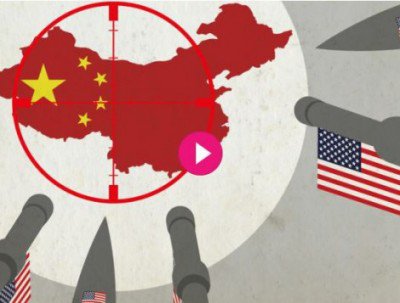Congressional Hawks Seek to Give President Biden “A Blank Check” to Declare War on China

All Global Research articles can be read in 51 languages by activating the “Translate Website” drop down menu on the top banner of our home page (Desktop version).
To receive Global Research’s Daily Newsletter (selected articles), click here.
Visit and follow us on Instagram at @crg_globalresearch.
***
Two weeks from yesterday marks 80 years since the Congress last issued a declaration of war as required by Article 1, Section 8, Clause 11 of the Constitution: The Congress shall have power to declare war. Invoked to launch or defend against wars 3 times in the 19th and twice in the 20th century, that Constitutional requirement has become as outdated as a dial telephone used to spread the news of the last one, December 8, 1941.
Once established as the world’s supreme superpower, American presidents, beginning with Harry Truman in 1950, decided to abandon the need to ask Congress to declare war. Incredibly, Congress went along with this enormous transfer of the war power to the president. When Truman decided to intervene in the Korean conflict, he simply called it a police action and began a military campaign that took several million Korean lives as well inflicting 128,000 U.S. casualties, of which 36,500 died. That’s some ‘police action’.
In the 71 years since, the US has engaged in dozens of wars, some so secret most Americans are oblivious to their occurrence. But in all that time Congress has never explicitly granted the 13 presidents succeeding Truman the power to unilaterally wage war. Congress pays lip service to Article 1, Section 8, Clause 11, occasionally even making efforts to take it back.
But a troubling new law proposed by a couple of Congressional hawks may explicitly authorize the president to wage war with China at any point in the future should China move to bring the island nation of Taiwan back under control of mainland China.
It’s called the Taiwan Invasion Prevention Act, introduced by Senator Rick Scott (R-FL) and Representative Guy Reschenthaler (R-PA). Besides pre-authorizing war upon China, the bill contains 10 other provisions that strengthen US ties to Taiwan in direct conflict with 5 decades of honoring the ‘One China’ policy. Called ‘strategic ambiguity’, that policy largely ignored escalating tension with China over Taiwan.
Scott and Reschenthaler use extreme rhetoric to promote their blank check for the president to declare war on China. “It is no secret that General Secretary Xi is bent on world domination. The United States cannot sit back and let this happen” (Scott). “The Taiwan Invasion Prevention Act empowers and strengthens Taiwan by authorizing the president to use military force to defend Taiwan against a direct attack” (Reschenthaler).
Apparently, Scott and Reschenthaler are attempting to update Article 1, Section 8, Clause 11 to read, The Congress shall have power to declare war…in advance.
*
Note to readers: Please click the share buttons above or below. Follow us on Instagram, @crg_globalresearch. Forward this article to your email lists. Crosspost on your blog site, internet forums. etc.
Walt Zlotow became involved in antiwar activities upon entering University of Chicago in 1963. He is current president of the West Suburban Peace Coalition based in the Chicago western suburbs. He blogs daily on antiwar and other issues at www.heartlandprogressive.blogspot.com.

